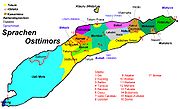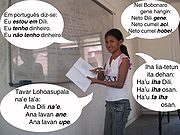
Languages of East Timor
Encyclopedia

Austronesian languages
The Austronesian languages are a language family widely dispersed throughout the islands of Southeast Asia and the Pacific, with a few members spoken on continental Asia that are spoken by about 386 million people. It is on par with Indo-European, Niger-Congo, Afroasiatic and Uralic as one of the...
and Papuan
Papuan languages
The Papuan languages are those languages of the western Pacific which are neither Austronesian nor Australian. The term does not presuppose a genetic relationship. The concept of Papuan peoples as distinct from Melanesians was first suggested and named by Sidney Herbert Ray in 1892.-The...
languages. (See Timor–Flores languages and West Trans–New Guinea languages
West Trans–New Guinea languages
The West Trans–New Guinea languages are a suggested linguistic linkage of Papuan languages, not well established as a group, proposed by Malcolm Ross in his 2005 classification of the Trans–New Guinea languages. Ross suspects they are an old dialect continuum, because they share numerous features...
.) The lingua franca
Lingua franca
A lingua franca is a language systematically used to make communication possible between people not sharing a mother tongue, in particular when it is a third language, distinct from both mother tongues.-Characteristics:"Lingua franca" is a functionally defined term, independent of the linguistic...
and national language of East Timor
East Timor
The Democratic Republic of Timor-Leste, commonly known as East Timor , is a state in Southeast Asia. It comprises the eastern half of the island of Timor, the nearby islands of Atauro and Jaco, and Oecusse, an exclave on the northwestern side of the island, within Indonesian West Timor...
is Tetum, an Austronesian language influenced by Portuguese
Portuguese language
Portuguese is a Romance language that arose in the medieval Kingdom of Galicia, nowadays Galicia and Northern Portugal. The southern part of the Kingdom of Galicia became independent as the County of Portugal in 1095...
, with which it has equal status as an official language. The language of the Ocussi exclave is Uab Meto. Fataluku, a Papuan language widely used in the eastern part of the country (often more so than Tetum) has official recognition under the constitution
Constitution
A constitution is a set of fundamental principles or established precedents according to which a state or other organization is governed. These rules together make up, i.e. constitute, what the entity is...
, as do other indigenous languages, including: Bekais, Bunak
Bunak language
The Bunak language is the language of the Bunak people of the mountainous region of central Timor, split between the political boundary between West Timor, Indonesia, particularly in Lamaknen District and East Timor...
, Dawan, Fataluku, Galoli, Habun, Idalaka, Kawaimina, Kemak
Kemak language
Kemak is a language spoken in East Timor. An alternate name is Ema. It is most closely related to Tocodede and Mambai. It has the status of one of the national languages in the East Timor constitution, besides the official languages of Portuguese and Tetum. The number of speakers has fallen in...
, Lovaia, Makalero, Mambai, Tokodede and Wetarese.
The rise of lingua francas in the linguistically diverse East Timor, and the domination of several clans over others, have led to the extinction of many smaller languages. However, some of these are still in use as ritual languages or cants. Research done in the mid-2000s by the Dutch/Timorese linguist Aone van Engelenhoven, for example, revealed that the Makuva language, formerly spoken by the Makuva tribe but believed to have been extinct since the 1950s, was still used occasionally. In 2007, Van Engelenhoven discovered the existence of another language that was essentially extinct, called Rusenu
Rusenu language
Rusenu is a recently discovered , essentially extinct Papuan language formerly spoken in Eastern East Timor.Rusenu was discovered quite accidentally...
.
Official languages

Dili
Dili, spelled Díli in Portuguese, is the capital, largest city, chief port and commercial centre of East Timor.-Geography and Administration:Dili lies on the northern coast of Timor island, the easternmost of the Lesser Sunda Islands....
, known as Tetun Prasa, as opposed to the more traditional version spoken in rural areas, known as Tetun Terik. Tetun Prasa is the version more widely used, and is now taught in schools.
Under Indonesian rule, Indonesian
Indonesian language
Indonesian is the official language of Indonesia. Indonesian is a normative form of the Riau Islands dialect of Malay, an Austronesian language which has been used as a lingua franca in the Indonesian archipelago for centuries....
was the official language. Along with English
English language
English is a West Germanic language that arose in the Anglo-Saxon kingdoms of England and spread into what was to become south-east Scotland under the influence of the Anglian medieval kingdom of Northumbria...
, it has the status of a 'working language' under the Constitution
Constitution
A constitution is a set of fundamental principles or established precedents according to which a state or other organization is governed. These rules together make up, i.e. constitute, what the entity is...
.
For many older East Timorese, the Indonesian language has negative connotations with the Suharto regime, but many younger people have expressed suspicion or hostility to the reinstatement of Portuguese, which they see as a 'colonial language' in much the same way that Indonesians saw Dutch
Dutch language
Dutch is a West Germanic language and the native language of the majority of the population of the Netherlands, Belgium, and Suriname, the three member states of the Dutch Language Union. Most speakers live in the European Union, where it is a first language for about 23 million and a second...
. However, whereas the Dutch culture and language had little influence on those of Indonesia, the East Timorese and Portuguese cultures became intertwined, particularly through intermarriage, as did the languages. Portuguese was also a working language of the resistance against Indonesia.

Many foreign observers, especially from Australia
Australia
Australia , officially the Commonwealth of Australia, is a country in the Southern Hemisphere comprising the mainland of the Australian continent, the island of Tasmania, and numerous smaller islands in the Indian and Pacific Oceans. It is the world's sixth-largest country by total area...
and Southeast Asia
Southeast Asia
Southeast Asia, South-East Asia, South East Asia or Southeastern Asia is a subregion of Asia, consisting of the countries that are geographically south of China, east of India, west of New Guinea and north of Australia. The region lies on the intersection of geological plates, with heavy seismic...
have also been critical about the reinstatement of Portuguese, to which they would prefer English or Indonesian. In spite of this, many Australian linguists have been closely involved with the official language policy, including the promotion of Portuguese.
Portugal
Portugal
Portugal , officially the Portuguese Republic is a country situated in southwestern Europe on the Iberian Peninsula. Portugal is the westernmost country of Europe, and is bordered by the Atlantic Ocean to the West and South and by Spain to the North and East. The Atlantic archipelagos of the...
and other Portuguese language countries such as Brazil
Brazil
Brazil , officially the Federative Republic of Brazil , is the largest country in South America. It is the world's fifth largest country, both by geographical area and by population with over 192 million people...
have supported the teaching of Portuguese in East Timor. Some people in East Timor have complained that teachers from Portugal and Brazil are poorly equipped to teach in the country, as they do not know local languages, or understand the local culture.
Nevertheless, the late Sérgio Vieira de Mello
Sérgio Vieira de Mello
Sérgio Vieira de Mello was a Brazilian United Nations employee who worked for the UN for more than 34 years, earning respect and praise around the world for his efforts in the humanitarian and political programs of the UN...
, who headed the United Nations Transitional Administration in East Timor
United Nations Transitional Administration in East Timor
The United Nations Transitional Administration in East Timor provided an interim civil administration and a peacekeeping mission in the territory of East Timor, from its establishment on October 25, 1999 until its independence on May 20, 2002 following the outcome of the East Timor Special...
, was a Brazilian who not only established a close working relationship with Xanana Gusmão
Xanana Gusmão
Kay Rala Xanana Gusmão GCL is a former militant who was the first President of East Timor, serving from May 2002 to May 2007...
(The country's first President) as a fellow Portuguese-speaker, but was respected by many East Timorese because of his efforts to learn Tetum.
External links
- Pictures from a Portuguese language course using Tetum published in the East Timorese newspaper :pt:Lia Foun in Díli
- Línguas no Timor website in Portuguese, but contains links to articles in English
- Languages of Timor Lorosae - part of EthnologueEthnologueEthnologue: Languages of the World is a web and print publication of SIL International , a Christian linguistic service organization, which studies lesser-known languages, to provide the speakers with Bibles in their native language and support their efforts in language development.The Ethnologue...
- The Languages of East Timor: Some Basic Facts
- FATALUKU COMMUNITY: English and Fataluku Website for researching the Fataluku Language

